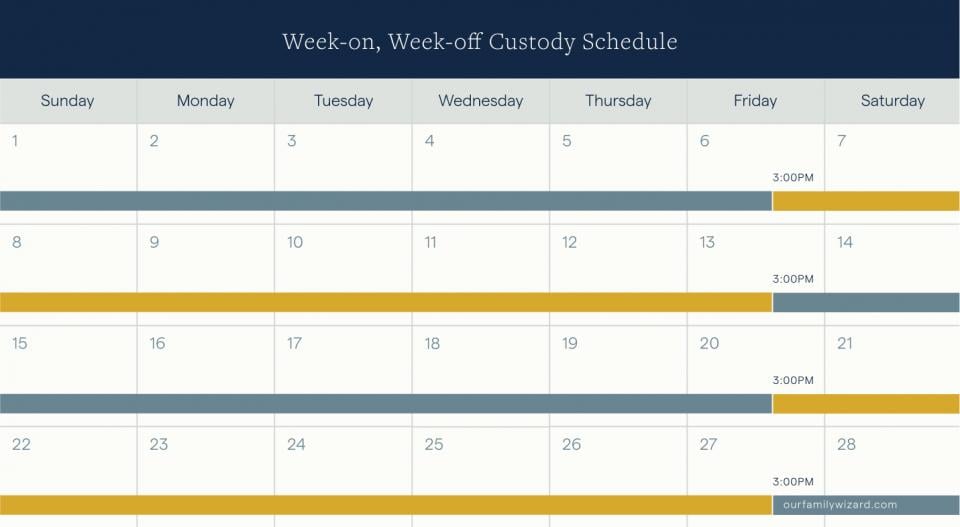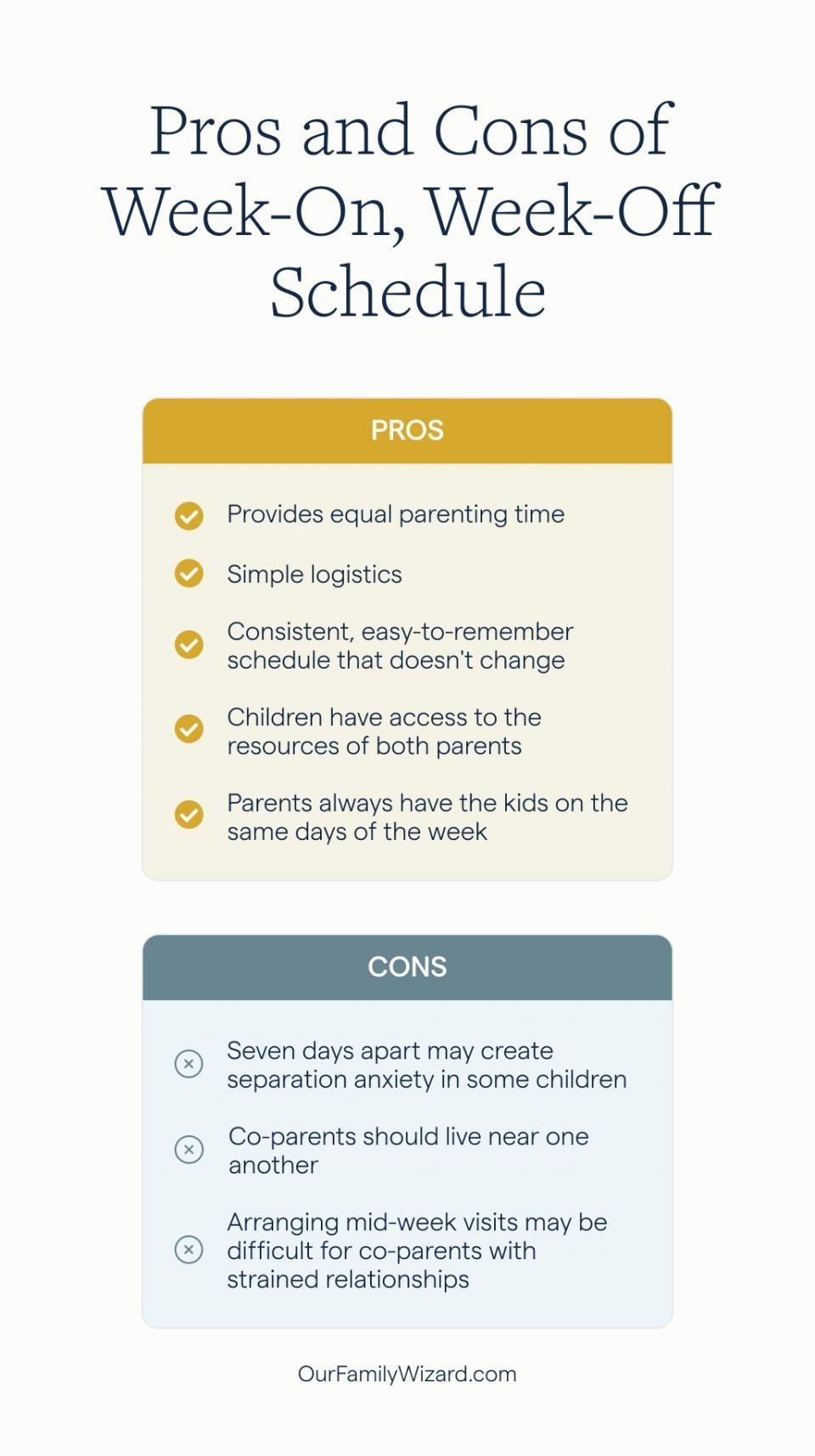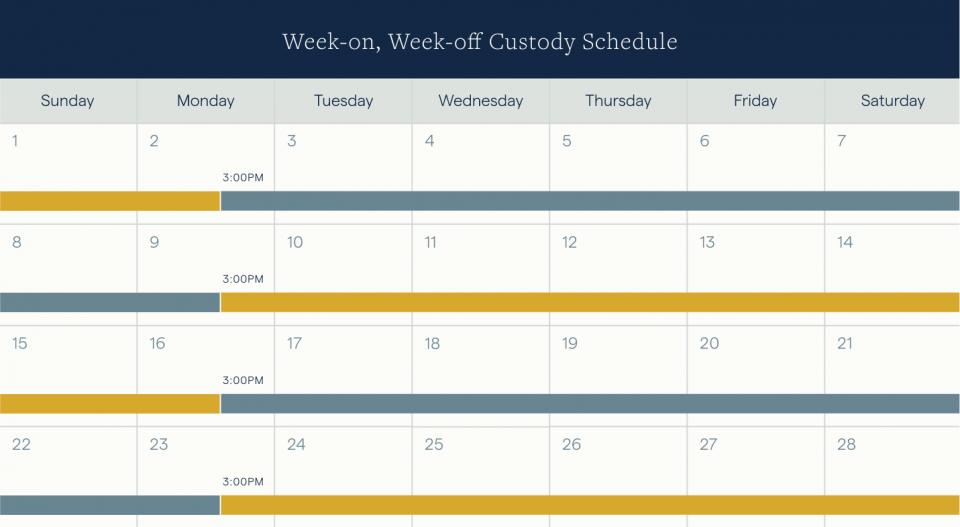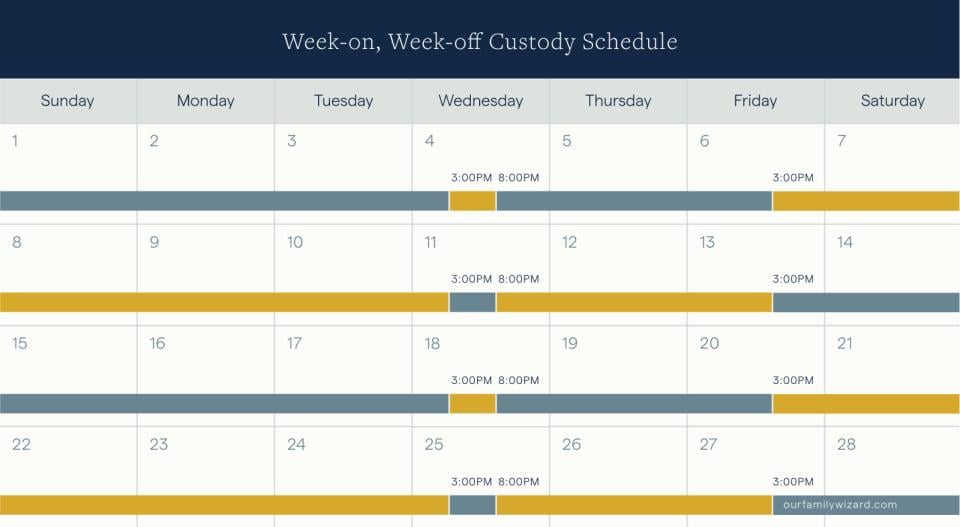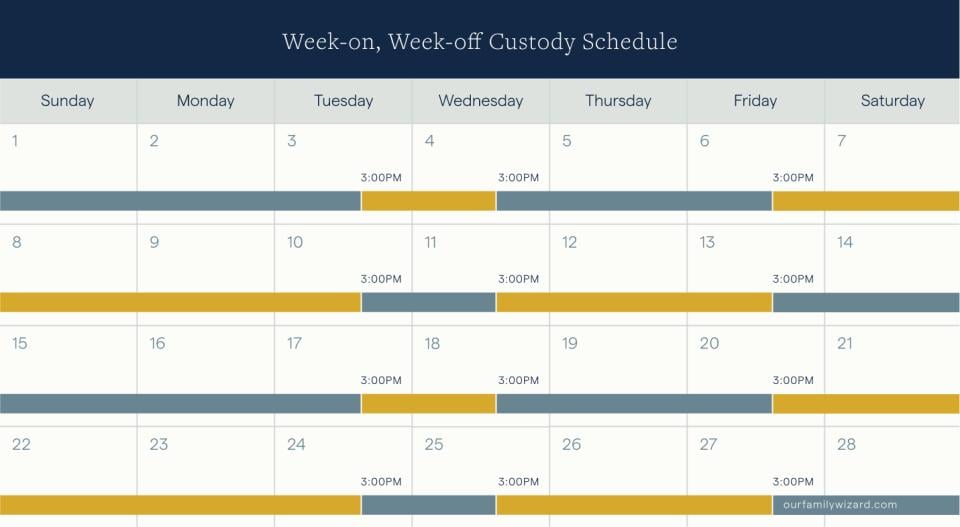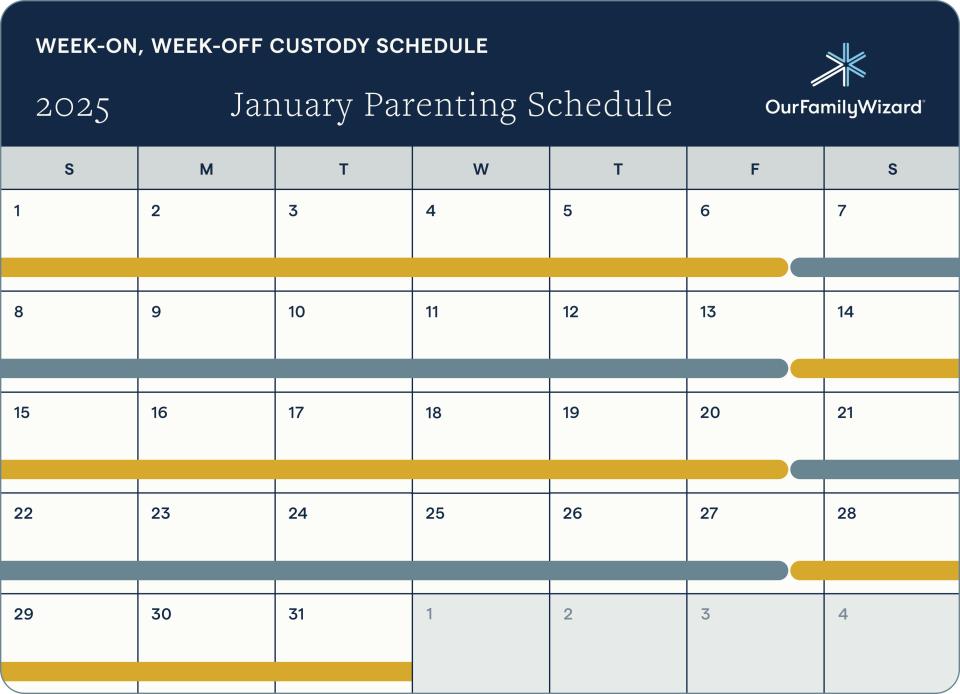Week-on, Week-off Custody Schedules: Alternating Weeks in Your Parenting Plan
For co-parents with 50/50 physical custody, alternating weeks is the simplest parenting schedule available. When following this arrangement, children spend one week with one parent and then one week with the other. This can simplify the scheduling of changeovers immensely.
As with all parenting schedules, however, it's not without its drawbacks. To help you decide whether alternating weeks is a good fit for your family, here are some of the major benefits and disadvantages of this parenting schedule.
What Is a 7/7 Custody Schedule?
Under a 7/7 parenting schedule, co-parents share physical custody equally in seven-day intervals. Children will spend one week with one parent and the next week with the other. This streamlined schedule minimizes transitions but also increases time apart.
Key Takeaways
- The 7/7 or alternating weeks schedule splits parenting time equally between co-parents.
- The schedule features only one weekly exchange day, but children and co-parents go seven days between visits.
- Some co-parents add in a mid-week visitation to reduce time spent apart.
- Many experts recommend against the 7/7 plan for younger children who need frequent time with both parents to form proper attachments.
More co-parents embrace joint parenting time, in which they split joint physical custody into different proportions and intervals. Various forms of the 50/50 custody schedule, where co-parents share custody equally, continue to grow in popularity.
The benefits of equal time with each co-parent can be significant. Many child development and legal experts agree that frequent, meaningful contact with both parents can positively affect children for the rest of their lives. However, even for agreeable co-parents with a healthy, cooperative relationship, any custody schedule demands effective communication and a willingness to compromise. The 7/7, or alternating week schedule, provides the easiest way to split time 50/50.
You’ll often see the week-on/week-off or alternating weeks schedule rotation referred to as a “custody schedule” or a “parenting schedule.”
In general, the term “custody” can refer to either the legal or physical custody of a child or children. Physical custody refers to where children live, and legal custody explains the power of each parent to make major decisions for their children.
Today, many experts use terms like “parenting schedule” or “parenting time arrangement” when speaking about where children live in place of “custody schedule.” These new terms better represent a relationship and the parent’s responsibilities for their children. This article will use these terms interchangeably.
Experts Emphasize The Child's Best Interest in Choosing 7/7 Plan or Any Schedule
Alternating weeks is a popular and desirable schedule, with simple logistics offering parents an appealing, easy-to-follow rotation. Still, the 7-on-7-off schedule is just one way to organize co-parenting time. A parenting plan will significantly affect the lives and routines of co-parents and children. That's why co-parents must consider all the options carefully before deciding on a routine, focusing on how the plan will affect their children.
 Attorney Jeralyn Lawrence puts it succinctly: "The driving force behind the structure of any parenting schedule should be the best interests of the child."
Attorney Jeralyn Lawrence puts it succinctly: "The driving force behind the structure of any parenting schedule should be the best interests of the child."
Brendan Hammer — a mediator, arbitrator and private client consultant at Matador ADR — echoes Lawrence's comments. "While a split week can be desired by parents for many reasons, a child-centric focus upon what is best for the kids is critical," Hammer says. "After that, transportation, logistical and other considerations are obviously vital."

Benefits of Alternating Weeks Custody Schedule
The major benefit of the alternating weeks custody schedule is its simple structure. A single exchange day each week reduces miscommunication and stress. Also, children can easily follow the plan.
The alternating weeks parenting plan aligns co-parenting rotations with the structure of a typical week. As a result, co-parents and children can easily remember the schedule and adapt the rotation to their existing routines.
Here's a summary of the benefits of the week-on, week-off custody schedule:
- Fewer changeovers:
Parents and children alike can benefit from a schedule with few changeovers. With this schedule, co-parents will exchange time with their children just once per week, usually at the end or beginning of the week. This ingrained structure will demand less precise communication than other 50/50 schedules with two or even three weekly exchanges. For co-parents with a tense relationship, fewer interactions will ease stress for the entire family.
Hammer points out that fewer exchanges will also "allow for a child to become settled and adjusted to each parent's home, reducing the chance that the children will feel bounced back and forth." - Consistent schedule:
Among 50/50 schedules, the week-on and week-off rotation provides the most consistency. During their respective weeks, co-parents will spend every day with their children. For parents, this repeatable schedule makes managing life outside of parenting easy. Likewise, children won't have any problem remembering whose house they'll be sleeping in that night or where they'll go after school.
Overall, the clear schedule reduces disorientation and stress for everyone. In contrast, co-parents and their children may struggle to keep track of a more dynamic plan like the 2-2-3 custody schedule, in which the days of the week per parent change regularly. - Longer periods of time together:
With a full week together, co-parents and their children can relax and spend time with one another without having another exchange day in the back of their minds. Also, this gives the family the space to experience the different rhythms of weekdays and weekends.
Disadvantages of Alternating Weeks Custody Schedule
The alternating weeks custody schedule keeps children and co-parents away for a week at a time. This time apart can cause separation anxiety in children and may make co-parents feel that they're missing out on important events in their children's lives.
Here's a summary of the disadvantages of the week-on, week-off custody schedule:
- Increased time apart:
A full week away from either parent may cause separation anxiety, particularly in younger children.
Hon. Sandy Karlan (Ret.) stresses that anyone considering the 7/7 schedule "should be conscious of the developmental stages of their children. Even one week apart from a significant caregiver during the early stages of bonding can cause unneeded stress and change how the children attach to and interact with either parent. Co-parents with younger children must recognize that this schedule won't be in the best interest of children below school age. Later on, as the children age, co-parents can re-consider if the schedule will be beneficial."
that anyone considering the 7/7 schedule "should be conscious of the developmental stages of their children. Even one week apart from a significant caregiver during the early stages of bonding can cause unneeded stress and change how the children attach to and interact with either parent. Co-parents with younger children must recognize that this schedule won't be in the best interest of children below school age. Later on, as the children age, co-parents can re-consider if the schedule will be beneficial."
Attorney Lawrence encourages co-parents to consider options that allow for some midweek visits. Lawrence notes: "If you believe, based on the age of the children and their schedules, that a week-on/week-off schedule is in their best interest, consider allowing a mid-week dinner visit or some contact with the other parent. Week on/week off schedules are rare, but if it is the right fit for your family, make every effort to stay active and present in your child's daily life."
Co-parents may also feel the effect of a week apart, especially if their children are at a formative age and going through new experiences. With a full week apart, each co-parent will inevitably miss out on experiencing or sharing in some parts of their children's lives. - Requires effective, healthy communication between co-parents:
In general, the alternating weeks schedule reduces interactions between co-parents. However, this situation changes if co-parents incorporate mid-week visits, sleepovers, or nightly calls. In these common scenarios, co-parents must be ready to communicate and coordinate effectively. - Can be difficult to coordinate childcare:
Co-parents may find it difficult to drop off and pick up their children from school for a full week and may need to rely on after-school care. This situation can be difficult if parents don't live near one another and have to coordinate different after-school care options every other week. - Requires both parents to be involved with their children's activities
Since each parent would spend a full week with their children, they both must be available to assist with their children's day-to-day tasks and activities. This can include helping with homework, getting them to and from extracurriculars, attending sports games or music lessons, and more. This schedule can be difficult if both parents aren't able to offer this kind of support consistently.
Research on How 50/50 Custody Schedules Affect Child Development
Researchers agree that custody schedules can deeply affect child development. In addition, most experts agree that meaningful contact with both parents, particularly at a young age, can have lifelong, positive impacts. First, however, co-parents should consult with a specialist to discuss their situation.
Attachment theory focuses on how deep and enduring bonds between two people develop. This theory also describes how different parent-child relationships can impact children's development and their subsequent relationships into adulthood.
Robust research has shown that children can simultaneously develop attachment relationships with more than one caregiver. Thus, many experts encourage both parents to be present and active in a child's life, arguing that this situation will lead a child to form a secure attachment with both of their parents.
Here are three important takeaways from current research in this field:
- Children's attachment styles with their parents will affect their future relationships.
Experts agree that secure attachment styles leave their fingerprints on the relationships children form later in life. Likewise, an insecure attachment could harm how the child interacts with others in the future. This recommendation has impacted how parenting experts consider whether parenting plans can help or hinder a young child. - Young children in frequent contact with both parents will develop secure attachment styles.
In a 2018 research article, psychologist and family expert Dr. Michael E. Lamb examines the results of five studies that individually tested the effect of different parenting arrangements on young children and toddlers. In the article published in the Journal of Child Custody: Research, Issues, and Practices, Dr. Lamb writes: "Consistent with attachment theory, the evidence suggests that children benefit when parenting plans allow them to maintain meaningful and positive relationships with both of their parents."
In a seminal 2001 paper, Dr. Lamb and colleague Dr. Joan B. Kelly specifically recommend that the implications of attachment theory should guide co-parents when they develop parenting plans. They advise: "When parents separate, children often experience distress, and their adjustment is adversely affected when the relationship with one of their parents is severed. This can be avoided by developing parenting plans that continue to ensure that children have regular interaction with both parents in a broad array of contexts. Overnight periods provide opportunities for many important interactions." - Some experts feel that secure attachment should be prioritized for a single co-parent and argue that frequent exchanges can create insecure attachments in children.
It's important to note that although most experts agree that caretaking in multiple contexts promotes each parent's bond, other studies suggest that sometimes the stress of constantly shifting houses may overshadow the stress of time apart. In a 2013 paper titled "Overnight custody arrangements, attachment, and adjustment among very young children," published in the Journal of Marriage and Family, researchers analyzed data on young children whose parents lived apart.
The researchers found that "frequent overnights were significantly associated with attachment insecurity among infants, but the relationship was less clear for toddlers." They also directly challenge the opposing argument, which supports that frequent visits between both parents will lead to secure attachment. They write: "The present investigation is the third of four studies of the topic that show some evidence of increased insecurity among very young children who have frequent overnights, perhaps particularly in the face of parental conflict.”

What Is the Best Age for Week-on-Week-off Custody?
Most experts agree that older children and teenagers can thrive under week-on-week-off custody. In contrast, children not yet at school age may be anxious about time apart. However, experts have not yet agreed on specific age recommendations.
Hammer cautions: "Although each circumstance is unique, younger children typically have a more difficult time with the alternating week schedule. By contrast, teenagers can often thrive under this schedule because it can be very compatible with a teen's already demanding school, athletic, and extracurricular schedule."
Judge Karlan suggests that co-parents with young children—particularly infants and toddlers—should "reduce the uncertainty and complications in your child's life. Co-parents who want meaningful relationships with their children should be cautious before imposing time apart on young children. On the other hand, these schedules can work well for older children who have passed the early stages of bonding and are less needy."
Judge Karlan notes that families can usually make any schedule work so long as the child does not feel divided loyalty toward one parent.
"Don't impose the divorce conflict onto the children," Judge Karlan says. "Integrate them into your lives and try to mirror basic procedures across both households—use the same kind of bed, same kinds of foods, and implement the same ground rules. This consistency creates strong commonalities across both homes, and children won't feel anxious in either home. These simple changes can go a long way toward helping children grow to be well-adjusted."
As in all family situations, your specific circumstances will greatly influence your options and approach toward parenting plans. That's why Judge Karlan recommends that co-parents "get some guidance and make a custody schedule with a specialist in child development. As judges, we work based on statutes, which can be limiting in unique situations. Consulting with an expert on your specific situation will help you avoid potential pitfalls and make sure your children grow up healthy, happy, and well-balanced."
Examples of 7-on and 7-off Parenting Schedules
Many co-parents add mid-week visits and sleepovers to their off-week to break up the week. These changes can help alleviate the needs of younger children who struggle with time apart. To better understand your options, explore different types of 7-on-7-off parenting schedules.
Week-on-week-off Custody Schedule Starting on a Monday
Example of a week-on, week-off custody schedule starting on a Monday
Here's how the alternating weeks schedule will look for one month, without any changes. Typically, co-parents start the schedule over the weekend or on a Monday. This schedule repeats every month.
Co-parents often modify the calendar to break up the long week apart. For example, some co-parents add a midweek visit from the off-parent during the week, like a dinner out. These variations can benefit families with younger children who may struggle when they're away from one parent for too long.
Week-on-Week-off with a Midweek Visit Custody Schedule
Example of a week-on, week-off custody schedule with a midweek visit
Adding in a mid-week sleepover is another way to change the schedule and decrease the time a child spends apart from a co-parent. Remember, so long as both co-parents maintain an off-week visit or sleepover, the plan still ensures 50/50 parenting time.
Week-on-week-off with a Midweek Sleepover Custody Schedule
Example of a week-on, week-off custody schedule with a midweek sleepover
Free 7-7 Joint Custody Schedule Template
Use our free 7-7 custody schedule template to picture how the 7-7 joint custody schedule parenting plan will fit into your family's routine. Then, experiment with different exchange days and variations to modify the schedule and create the best plan possible.
The alternating weeks schedule may sound easy, but it can present unforeseen complications. Before implementing any plan, try mapping out everyone's events, obligations, and scheduling concerns onto a prebuilt, printable schedule. Our template will help you zoom out and see how the plan may work in practice. Also, this template can guide co-parents when planning and tracking mid-week visits and sleepovers.
Questions to Ask When Considering a Split Week Custody Schedule
Consider some expert questions designed to highlight potential conflicts and issues before they occur. These questions will help the entire family picture life under a split week schedule. For example, co-parents should assess their motivations behind implementing the schedule.
Here's a list of questions and discussion points that co-parents should discuss before diving into a split-week schedule.
- "Consider the realistic ability of the children to handle the schedule," says attorney Hammer.
- "How old are the children?" is a critical question from Judge Karlan. "If they're below school age, consider how the alternating weeks schedule could impact their development."
- "Can both co-parents support the homework and activities of the children?" Judge Karlan continues, adding, "Do both parents have time to spend with the children?"
Some other questions include the following:
- Can both parents introduce a mid-week visit or sleepover?
- Do the parents live near one another?
- Do the parents maintain a comfortable relationship where they can both attend extracurricular events and handle coordinating exchanges?
- Can both parents help the children with homework during the school week?
- Can both parents get the children to and from extracurriculars and other activities during the week and on weekends?
- If needed, do the parents both have access to childcare?
Alternatives to Week-on, Week-off Parenting Schedules
Alternatives to the week-on, week-off parenting schedules still provide 50/50 custody but reduce time spent apart. For example, you can add a mid-week visit to the week-on, week-off schedule or try plans like 2-2-3 that incorporate more changeovers.
Here are three alternative schedules to the week-on-week-off schedule that vary in how much time children spend apart from each co-parent. Each plan has unique benefits and challenges.
- Alternating weeks schedule with a mid-week visit:
Under this schedule, co-parents add a mid-week visit during their off week. This can take the form of a quick dinner, or co-parents can arrange an overnight stay. - 2-2-3 custody schedule:
The 2-2-3 schedule minimizes the time children spend apart from co-parents. In this schedule, parents alternate two- and three-day blocks with the children. The frequent exchanges can be difficult to keep track of, and the days of the week per parent change. - 3-4-4-3 custody schedule:
In a 3-4-4-3 parenting schedule, the first parent has their children for four overnight visits, and then the second has them for three. Next week, the days swap: The first parent has their children for three days, and the second has them for four. This schedule resembles the 2-2-5-5 most closely but doesn't give both parents a long weekend visit each week. - 2-2-5-5 custody schedule:
In a 2-2-5-5 parenting schedule, the first parent has their children for two overnights. Then, the other parent is with them for two nights. After that, the first parent is with their children again for five overnights. The other parent gets five overnight visits. This schedule typically allows parents to have weekend time every other week.
Easiest Way to Manage Custody Schedules
Managing the custody schedule takes a team effort. Luckily, you don't have to rely on old-school methods to manage your schedule. Instead, using OurFamilyWizard can help you manage your schedule with ease—no paper calendars required.
Attorney Hammer describes OurFamilyWizard as an "amazing resource that can be calibrated to each family's needs. OurFamilyWizard is the gold standard for communication and calendaring platforms."
Judges, attorneys, and child experts around the world recommend that co-parents use OurFamilyWizard custom-built calendaring tools. The app lets you easily add, manage, and track schedule changes and special occasions, with help from tools like schedule change requests and a holiday scheduler builder. In addition, the single shared parenting schedule keeps both co-parents in sync, so miscommunication can't get in the way of effective co-parenting.
OurFamilyWizard co-parenting app can be your digital ally in a stress-free approach to the unanticipated challenges of co-parenting.

